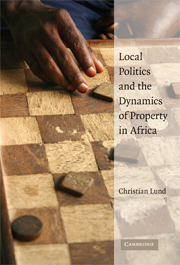Book contents
- Frontmatter
- Contents
- List of Maps, Figures, and Tables
- Acknowledgments
- Abbreviations
- Map 1 The Gold Coast, 1907
- Map 2 Regions of Ghana since 1983
- 1 Introduction
- 2 “This Situation Is Incongruous in the Extreme”: The History of Land Policies in the Upper Regions of Ghana
- 3 Who Owns Bolgatanga? The Revival of the Earthpriest and Emerging Tensions over Property
- 4 Seizing Opportunities: Chieftaincy, Land, and Local Administration
- 5 Settled Facts or Facts to Settle: Land Conflicts under Institutional Uncertainty
- 6 “Bawku Is Still Volatile”: Ethnopolitical Conflict and State Recognition
- 7 The Rent of Nonenforcement: Access to Forest Resources
- 8 Small Dams and Fluid Tenure
- 9 Conclusion
- References
- Index
4 - Seizing Opportunities: Chieftaincy, Land, and Local Administration
Published online by Cambridge University Press: 25 July 2009
- Frontmatter
- Contents
- List of Maps, Figures, and Tables
- Acknowledgments
- Abbreviations
- Map 1 The Gold Coast, 1907
- Map 2 Regions of Ghana since 1983
- 1 Introduction
- 2 “This Situation Is Incongruous in the Extreme”: The History of Land Policies in the Upper Regions of Ghana
- 3 Who Owns Bolgatanga? The Revival of the Earthpriest and Emerging Tensions over Property
- 4 Seizing Opportunities: Chieftaincy, Land, and Local Administration
- 5 Settled Facts or Facts to Settle: Land Conflicts under Institutional Uncertainty
- 6 “Bawku Is Still Volatile”: Ethnopolitical Conflict and State Recognition
- 7 The Rent of Nonenforcement: Access to Forest Resources
- 8 Small Dams and Fluid Tenure
- 9 Conclusion
- References
- Index
Summary
Have you never heard, Mr. Visconti said, that beer is much more intoxicating drunk through a straw?
Surely that is a legend.
There speaks a Protestant, Mr. Visconti said. Any Catholic knows that a legend which is believed has the same value and effect as the truth.
Graham Greene, Travels with My AuntIntroduction
The presence of the past in the present is notable in Bolgatanga. Conflicts over land and chieftaincy are characterized by an intense reference to the past as the source of unadulterated legitimacy of claims to the future. The past and lines of heritage are frequently rehearsed in Ghana. It is a pastime in which everyone who depends on pedigree for position or privilege engages with passion. However, two different forms of past are often at play at the same time (Berry, 2004). On the one hand, reference is made to tradition as a timeless past, a reservoir of “how things have always been done” in the constant flow of time. On the other hand, there is a past made up of significant historical events, of actions and transactions that are invoked with various vindications. The two pasts are rather different from one another. One justifies claims to the future as a seamless continuation of the past; the other justifies them as the result of salient fortunate events.
- Type
- Chapter
- Information
- Local Politics and the Dynamics of Property in Africa , pp. 68 - 89Publisher: Cambridge University PressPrint publication year: 2008

